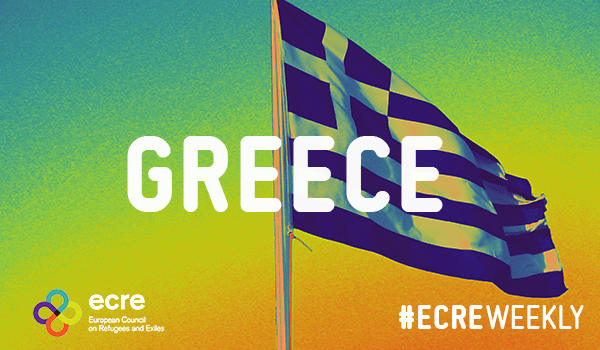A group of detainees in the Paranesti pre-removal detention centre in the Northeast Drama region of Greece began a hunger-strike on 30 January, protesting torture by police officers. The European Court of Human Rights (ECHR) has confirmed a settlement in which the Greek government agrees to compensate an Ethiopian woman for inhumane and degrading living conditions in the Samos hotspot. New reports from Legal Centre Lesvos and Mare Liberum add to the mounting evidence of systematic pushbacks by Greek authorities in the Aegean Sea.
The internal affairs division of the Greek police force has launched an investigation into reports of violence against a group of asylum seekers in the Paranesti pre-removal detention centre and informed the Ombudsman of the allegations. The group that was protesting the extension of their detention beyond the legal limit of 18 months went on hunger-strike on 30 January following violence by police officers storming their cells and beating them with batons. Reportedly, only three of the people injured during the violence were taken to the coroner, and the anti-racist group KEERFA has published documentation of their injuries.
On 21 January 2021, the European Court of Human Rights (ECHR) published a decision confirming a settlement in the case of H.A. V. Greece. The Refugee Law Clinic Berlin representing the Ethiopian national Ms. H.A. states in a press release that she was: “6 months pregnant when she arrived to the (Greek) island of Samos where she planned to apply for asylum. Despite her pregnancy, authorities neglected to provide her further material assistance, forcing her to reside in a makeshift shelter in the Samos „hotspot“ for nearly three months”. H.A. alleged that Greece had violated the prohibition of inhuman and degrading treatment under Article 3 of the European Convention on Human Rights and the Greek Government’s failure to comply with the interim measure constituted a violation of Article 34 of the Convention. As the Greek government agreed to pay a compensation of 5,000 Euro to cover any pecuniary and non-pecuniary damages to Ms. H.A. the ECHR did not rule on merits of the case but a series of similar cases are pending before the court. According to the Refugee Law Clinic Berlin the case cannot be seen in isolation from the thousands of others currently suffering in the camps on Samos, Lesvos, Chios, Kos and Leros. The deteriorating situation in the camps across Greece, further worsening in winter, are well documented and particularly vulnerable groups and children are suffering under harsh conditions. Psychologist Katrin Glatz-Brubakk from Doctors Without Borders describes the situation for 2,000 children in the so-called Moria 2.0 camp in Kara Tepe as critical. They are becoming increasingly depressed and live in daily fear of kidnapping, violence and rape. A recent video from MSF Sea reveals the dire situation after fires, earthquakes and snow in the overcrowded Vathy camp in Samos with a capacity of 650 but housing 3,300 people. In a recent interview Greek Minister for Migration and Asylum, Notis Mitarachi defends the conditions of the island camps and calls for additional support from the EU.
Mare Liberum monitoring the human rights situation for refugees in the Aegean Sea has submitted a report to the United Nations Human Rights Office on a “dramatic increase of violence and ill-treatment of refugees in the Aegean”. According to the organisation they counted 321 pushbacks involving 9,798 people between March and December 2020. Based on 17 case studies involving more than 50 survivors from the same period and referencing growing press coverage, reports by civil society, and other investigations, the Legal Centre Lesvos concludes that: “Greek authorities are continuously and systematically conducting collective expulsions at Greece’s land and sea borders, putting migrants’ lives at grave risk and violating their rights, including the right to seek asylum”. Further the legal centre points out that: “Frontex, the European Border and Coast Guard Agency, and assets belonging to the North Atlantic Treaty Organisation (NATO) have been in the vicinity of, aware of, or potentially direct participants in collective expulsions.
On 29 January with the support of the Greens, the left-wing GUE, the liberals Renew, the centre-left S&D, and the centre-right EPP, MEPs from the Civil Liberties, Justice and Home Affairs (LIBE) Committee are establishing a Frontex Scrutiny Working Group, to investigate allegations of the EU’s border security agency’s role in the illegal ‘pushbacks’ of refugees. Due to division among the groups of the European Parliament, a full standard inquiry committee has not been set up and as a result, the scope of inquiry will be limited, excluding the role of the European Commission and member states. In his response to an ongoing inquiry by the European Ombudsman, Executive Director for Frontex, Fabrice Leggeri on 29 January outlined the agency’s plans and procedures related to its Complaints Mechanism for alleged breaches of fundamental rights.
Another 42 people have been relocated from Greece to Germany. The 10 families including 23 adults and 19 children bring the total of number relocations to 1,561 since March 2020.
For further information:
- ECRE, Greece: Unknown NGO to Receive Substantial EU Funds, Government Admits Lead Contamination in Moria 2.0, German Court Suspends Returns, January 2021
- ECRE, Greece: More Arrivals with One Death Reported, Conditions Worsening as Winter Hits Island Camps, January 2021
- ECRE, Greece: Significant Decrease of Arrivals – Chaos Continues, January 2021
Photo: ECRE
This article appeared in the ECRE Weekly Bulletin. You can subscribe to the Weekly Bulletin here.

